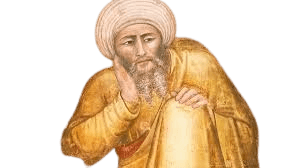Life and achievements
Early life
Averroes, in full Ibn Rushd, was born in 1126 in Cordoba, Spain, to a family of jurists and theologians. Al-Andalus, a learning center during the Islamic Renaissance, inspired him. He was highly educated and studied hadiths, fiqh, medicine, and theology from scholars and his father. His excellent family background helped him pursue philosophy, law, and science studies.
Averroes, who began learning early, was a philosopher at heart, like other Islamic philosophers such as Avicenna and Al-Farabi. He was also fond of Aristotle's works, which would later be incorporated into his philosophical system. Studying in Cordoba and later in Seville, he was able to be in touch with different trends and become a polymath.
At the beginning of his career, Averroes held several government judicial offices. He was appointed Seville's qadi in 1169 and later the qadi of Córdoba. His judicial duties did not hinder him from being an academic scholar; on the contrary, they provided him with practical experience in applying the Shari'a, which he used in his philosophical and legal writings. This position also exposed him to other scholars and philosophers, allowing him to share ideas that transformed his thinking.
At an early age, Averroes had friends and companions who were scholars; one of them was Ibn Tufayl, a philosopher and physician at the court of Marrakesh. This friendship later proved helpful to Averroes, and he won the favour of the Almohad Caliph Abu Yaqub Yusuf. This was an excellent advantage for Averroes since he could concentrate on writing commentaries on Aristotle's works.
Legacy
Averroes was a prolific writer whose works are spread across many fields of study in Muslim and European societies. Some of his philosophical works, especially the commentaries on Aristotle, played a role in transferring Greek philosophy to medieval Europe. These commentaries were translated into Latin and Hebrew; thus, the works of Aristotle affected European scholars and the development of Scholasticism.
In the Islamic world, Averroes's rationalism was continued by the following generations of philosophers, but it was not without opposition. He attempted to incorporate Aristotelianism into the framework of Islamic theology, which was not welcomed by conservative scholars and thus resulted in periods of exile. However, his works were remembered, discussed, and appreciated for their erudition and depth.
Averroes was also a great medical scholar and contributed immensely to medicine. His medical work, Kitab al-Kulyat fi al-Tibb or The General Principles of Medicine, was well known in medieval Europe and utilized by numerous physicians. Due to his holistic approach, he made progressive remarks on the causes of diseases and the structure of the human body.
Averroes's influence was felt during the Renaissance and Enlightenment. His propagation of the role of reason and faith formed the basis of the Enlightenment and discussions regarding the place of religion in society. European scholars, including Thomas Aquinas, referenced his works in their philosophical and theological writings.
Today, Averroes is considered one of the most outstanding philosophers and followers of reason who have always sought the truth. His life and works continue to inspire people and are still being analyzed and discussed by scholars and philosophers, thus stressing the importance of his achievements. Averroes has left a cultural impact on literature, film, and opera and, therefore, became a cultural symbol.
Milestone moments
Apr 14, 1126
The birth of Ibn Rushd
Averroes, or Ibn Rushd in the Latin world, was born in Cordoba, Spain, on April 14, 1126.
Coming from a family of lawyers and theologians, he was to follow the same tradition as his forebears.
Córdoba, once a center of learning during the Islamic Golden Age, was the ideal environment for Averroes's thinking.
At a very young age, he was exposed to the different branches of learning, including philosophy, medicine, law, and theology, which prepared him to contribute to these fields.
He was fortunate to attend some of the most famous schools and study under some renowned teachers, including his father. Thus, he valued learning and reasoning.
Oct 2, 1169
Nominated as the Qadi of Seville
In 1169, Averroes became a qadi, or judge, in the city of Seville, a critical step in his career.
This role showed his legal understanding of Islamic law and gave him practical experience applying legal norms.
He could engage with people, mediate and arbitrate in Seville as a judge, and issue fatwas (legal opinions), thus gaining the reputation of a wise and just scholar.
This position enabled him to engage with other scholars and enhance his philosophical and legal writings and concepts regarding reason in faith.
Oct 10, 1179
Conclusion of The Incoherence of the Incoherence
Averroes finished The Incoherence of the Incoherence in 1179; this was his direct reply to Al-Ghazali's The Incoherence of the Philosophers, in which Al-Ghazali had criticized the use of philosophy within the Islamic framework.
Averroes' work defended the role of Aristotelian philosophy and stated that reason and religion are not adversaries.
In his work, The Incoherence of the Incoherence, Averroes said that reason and faith are two different ways of reaching the same objective: truth.
Thus, this work strengthened Averroes's position as one of the most influential philosophers and rationalists in the Islamic tradition.
Dec 10, 1198
Death of Averroes
Averroes died on December 10, 1198, in Marrakesh, present-day Morocco.
His death marked the end of a highly productive period in the field of scholarship that linked the East and the West.
Although Averroes encountered criticism and hostility during his lifetime, he left behind many written works, and his ideas were passed on to the next generations.
His works were famous and used as philosophy, medicine, and law textbooks in the Islamic empire and medieval Europe.
His works translated into Latin and Hebrew ensured that he remained relevant to European scholars, and therefore, his place in the annals of philosophy and science was cemented.
